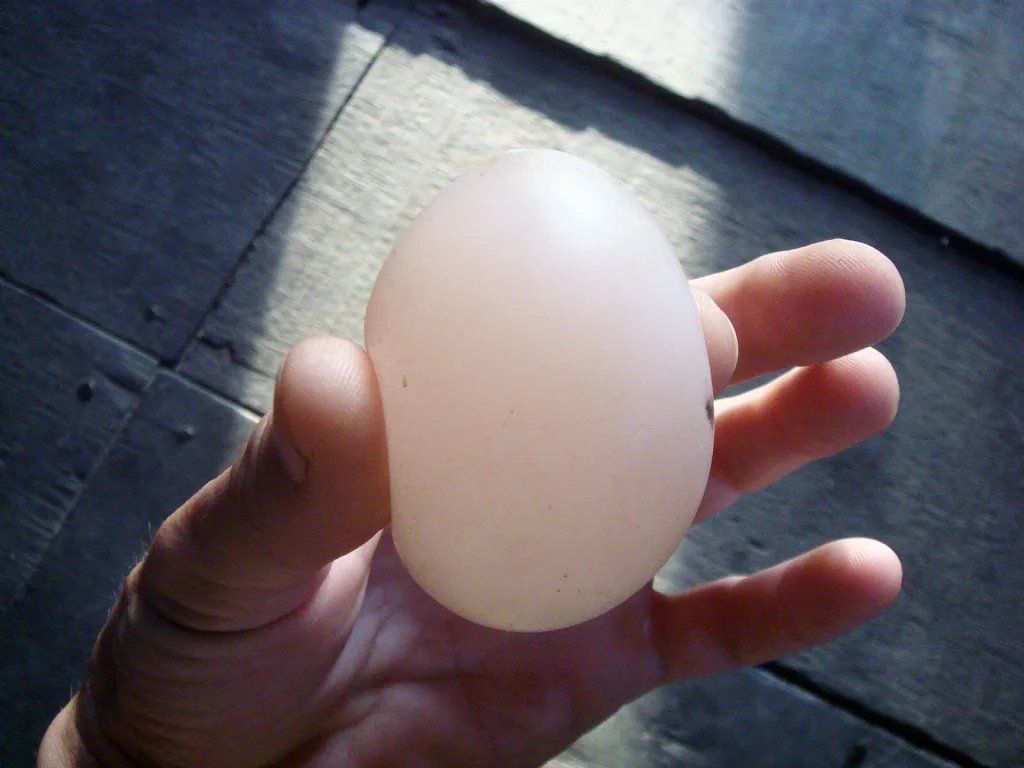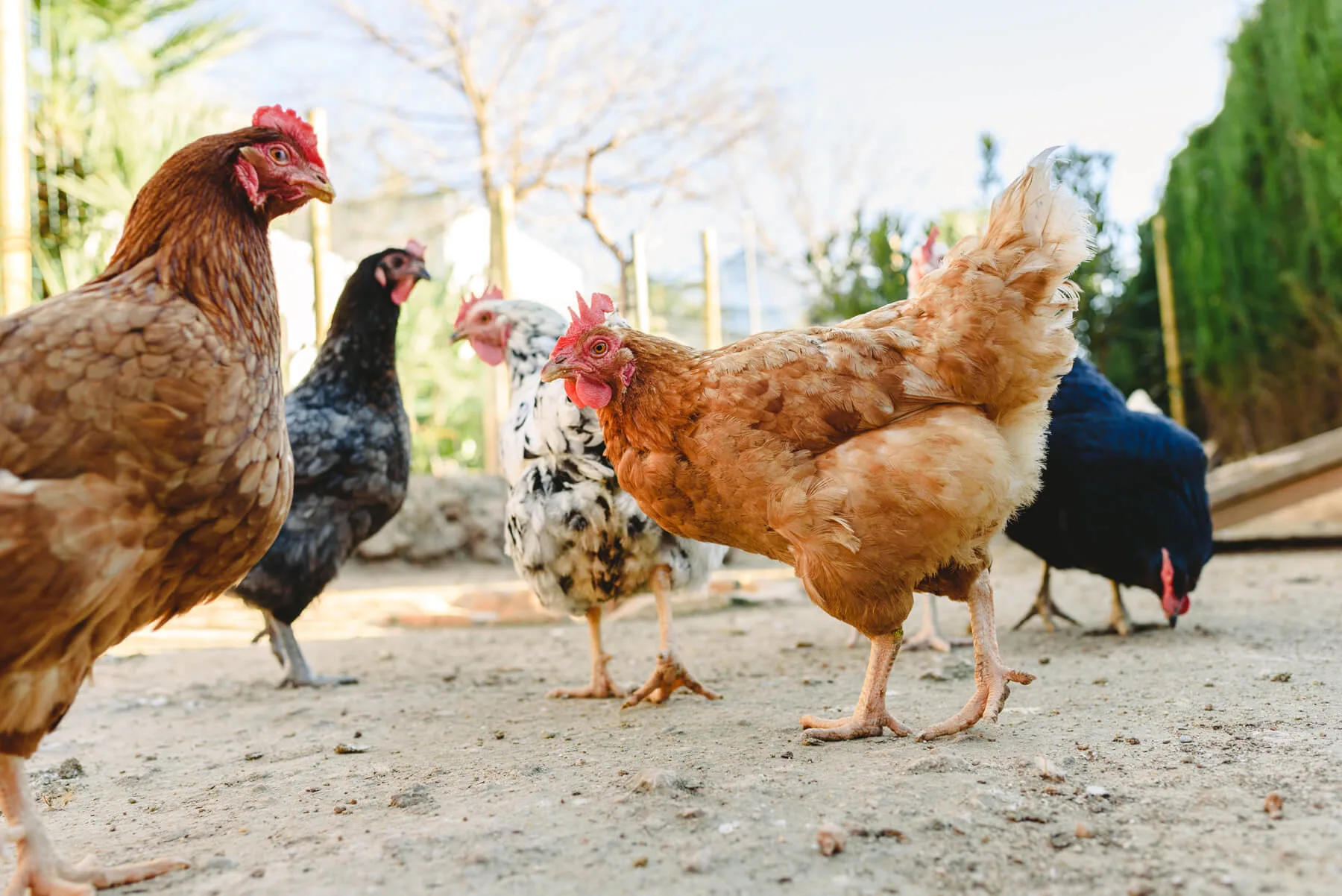Chickens are extraordinary creatures, and if you’re a backyard chicken enthusiast like us, you know the importance of keeping your feathered friends healthy and happy. One key aspect of their well-being is ensuring they get enough calcium. In this article, we will delve into the world of calcium for chickens and explore the best ways to give your poultry pals the calcium boost they need. Whether you’re wondering how to give chickens more calcium or if you can give them too much, we’ve got you covered.
Why do chickens need calcium?
Calcium is an essential nutrient and hens need it for various bodily functions, but its most famous role is in eggshell formation. Calcium is essential for strong, sturdy eggshells, which is crucial if you want your hens to lay healthy eggs regularly. A lack of calcium can lead to weak, brittle shells or even soft-shell eggs. Chickens experiencing calcium deficiency and producing brittle or soft-shell eggs may have difficulty laying. The process may become uncomfortable and even lead to issues like egg-binding. This happens when an egg gets stuck in their reproductive system and can be very serious if not taken care of quickly.
If you’re wondering “How do I get more calcium in my suburban flock’s diet”, keep in mind that it’s not only about the quantity but also the quality of the calcium. A balanced approach is key to maintaining your chickens’ health.

Natural sources of calcium for chickens
When it comes to supplementing calcium, it’s best to go natural. Chickens evolved to get their nutrients from whole foods, and calcium is no exception. Here are some excellent natural sources of calcium for your flock:
Crushed Eggshells
Save your eggshells, clean them thoroughly, and crush them into small pieces. They are an excellent source of calcium and a great way to recycle.
Before you feed them to your chickens though, there are some important do’s and don’ts to keep in mind:
- Never mix eggshells or any calcium supplement with your chickens’ regular feed, as this can lead to calcium toxicity.
- Eggshells should only be given to hens that are laying eggs, not young chickens.
- Avoid feeding your flock eggshells from store-bought eggs, as they may carry potential parasites or diseases.
- It’s crucial to crush the eggshells thoroughly to prevent any resemblance to eggs and discourage egg-eating behavior.
Additionally, eggshells should not be the sole source of calcium; always provide shell grit separately. To feed eggshells to your chickens, crush them and place them in a container within the coop without mixing them with other supplements or feed. Replace them if they become soiled or wet. It’s also a good practice to allow eggshells to dry or bake them before feeding to reduce the risk of passing on any contaminants. For flocks with mixed-age birds, offering free-choice eggshells and grit is generally safe as chickens typically consume them only when needed, reducing the risk of calcium toxicity, which is more common when supplements are mixed with commercial feed.
Oyster Shells
Oyster shells are a widely available source of calcium and are a favorite among many chicken keepers. They provide a slow-release calcium source that hens can access as needed.
You can typically find them at local feed stores or online poultry supply shops. To feed oyster shells to your chickens, crush them and provide them in a separate container within the coop. Chickens will instinctively consume them as needed, helping to regulate their calcium intake and prevent calcium deficiency.
Limestone
Limestone, or calcium carbonate, is another option for getting extra calcium in the diet, often available at feed stores. It can come finely grounded or as small chips. As mentioned already, it should be provided to your hens in a separate container, because as much as calcium is important,
Each of these sources has its advantages, so you can choose the one that fits best with your flock’s preferences and your management style.

Other ways to supplement calcium in the diet for your laying hen
In addition to natural sources like eggshells and oyster shells, there are alternative methods to ensure your chickens receive sufficient calcium. Some pet stores offer calcium supplements specifically designed for poultry. These supplements can be added to their drinking water, providing a fast and convenient way to boost calcium levels in emergencies. However, it’s crucial to remember that chickens are generally skilled at regulating their own calcium intake. If you find yourself needing to supplement their diet, monitor their consumption closely to prevent over-supplementation. Separating affected chickens, especially those with egg-laying difficulties, can also be a helpful strategy to manage calcium intake individually and ensure their well-being.

How do you add calcium supplements to your laying hens’ diet?
Let’s discuss how to give your chickens more calcium:
Free-choice feeding: The simplest way is to provide a separate container of calcium sources, like oyster shells or crushed eggshells, and let your chickens help themselves. This method allows them to regulate their calcium intake.
Offer treats: Scatter calcium-rich treats like crushed eggshells around their coop or run. This not only supplements their diet but also provides entertainment as they forage for the treats.
Mixed in their feed: You can mix calcium supplements in their food, but remember that over-supplementing can be dangerous for chickens, so proceed with caution.
Mixed in their water: If you have purchased liquid calcium, you can mix it in the water. Again, over-supplementing comes with its own problems. If you’re mixing it in the water, it’s best to separate the ones who need extra calcium and only give them the dosed water or if that’s not possible, keep a close eye on how much calcium per day your flock is getting.
Remember that moderation is key. Too much calcium can lead to health problems, so monitor your chickens’ intake to prevent over-supplementation.
Can you give chickens too much calcium? What happens if you give chickens excess calcium?
If you’ve been paying attention up until this point, you would have picked up on the point that while ensuring your flock gets enough calcium is essential, it’s equally crucial not to go overboard. Can you give chickens too much calcium? Yes, and here’s why it’s important to strike a balance.
Overfeeding calcium can lead to kidney damage in chickens. Their bodies have to work harder to process excess calcium, which can strain their renal system. This can result in kidney stones and other health issues.
To avoid over-supplementing, provide calcium separately from their regular feed and let your chickens regulate their intake. They’ll instinctively consume what they need.
Provide balanced nutrition for chickens
Chickens need more than just calcium for optimal health. A well-rounded diet should include a variety of nutrients, including protein, vitamins, and minerals. Consider the following to keep your flock in top shape:
Quality feed: Invest in high-quality chicken feed designed for their specific life stage (starter, grower, layer, etc.).
Fresh water: Ensure a constant supply of clean, fresh water. Water is vital for digestion and overall health.
Fruits and vegetables: Supplement their diet with fruits and vegetables to provide additional vitamins and minerals.
Protein: Depending on their age and purpose (egg-laying, meat), adjust their protein intake accordingly.
Conclusion: How to know when hens need calcium, what is a good source of calcium, and how to add extra calcium to the diet of laying hens?
Here’s the short and skinny of it. It takes a whole lot of calcium to produce eggs every day, and it’s absolutely essential to have enough of it in a hen’s diet. If your backyard chicken is laying brittle or soft-shelled eggs, you need to get some calcium in her pronto. Offering natural sources of free-choice calcium like crushed eggshells, oyster shells, or limestone is a great way to provide supplemental calcium to your flock. If you’re particularly concerned about a hen’s calcium levels and would like to ensure you get some in her as soon as possible, you can purchase calcium liquid to mix in her water. Just remember, too much calcium content in a chicken’s diet can lead to kidney damage, so try to avoid mixing calcium in their food and water, and instead offer it as a free choice. Chickens are pretty good at self-regulating their calcium needs. Maintain a balanced diet for your chickens, and they’ll reward you with strong eggshells and vibrant health. So, go ahead, provide your feathered friends with the calcium they need, and watch your flock thrive. Happy chickens, happy eggs!


